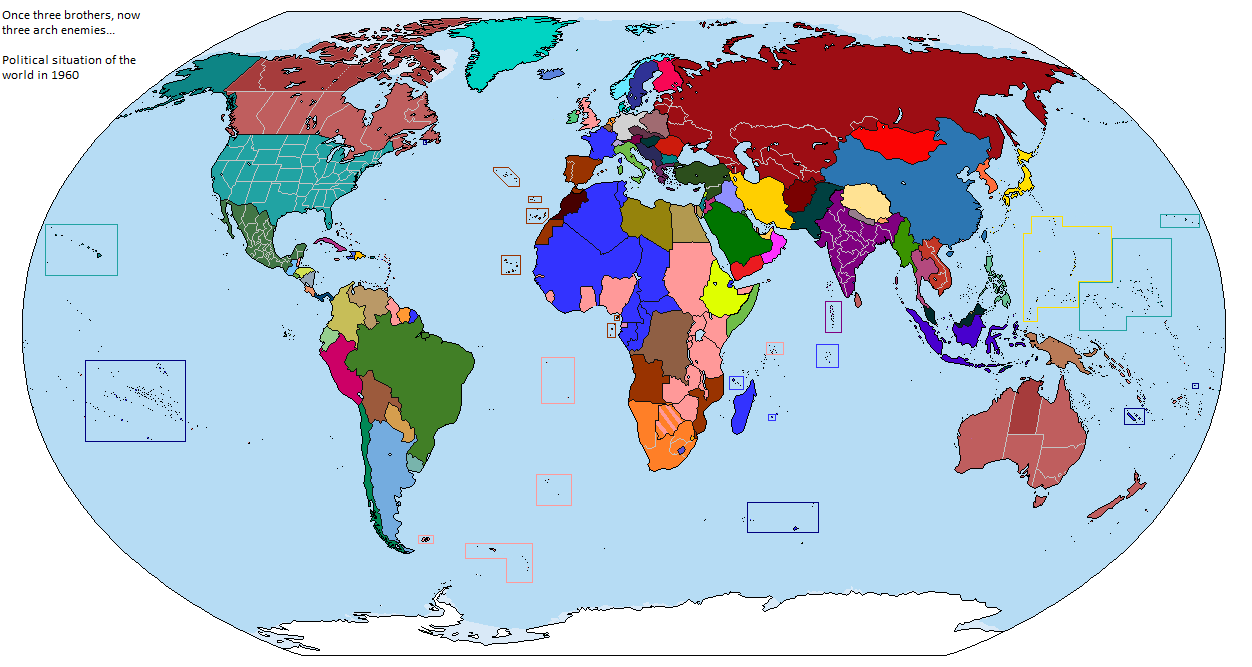HOME | DD
 Sir-Galuf — Three side Cold War - TRO based story
Sir-Galuf — Three side Cold War - TRO based story

#alternatehistory #coldwar #worldwar2 #politicalmap
Published: 2023-04-26 12:38:14 +0000 UTC; Views: 2371; Favourites: 10; Downloads: 3
Redirect to original
Description
Long time no see! So, my newest post is somehow the remake of the timeline "The nightmare is over". So, what's happening in this world?The main points of difference start in 1930's, and have great influence in the next events:
1. USA - In the president elections in 1932 it was the Hoover who gained the next term, altough Roosevelt kept significant influence in the politics of the USA. Like in our timeline, America entered to the WW II in 1941, but due to the attack of the U - boots on the cargo ship of the United States Fleet - One of the vivtims of this attack was Roosevelt, who was travelling to the United Kinghdom to negotiate the issue of war support from America to England. After his death, the public forced President Hoover to entered to the war with Axis Powers.
2. USRR - Stalin was overthrown in 1934's coup, and was replaced by Siergiei Kirov. The new ruler of Soviet Union has never started a great purge, and closed over half of working camps in Siberia, during his program of "Post Revolutionary Social Reconstruction". Despite his respect in Soviet society, he had to rule side by side with two another Political figures: Gieinrih Yagoda - Commander of NKVD and Michail Tukchachevsky - First Marshall of The Soviet Union and the main Commander of the Red Army. This Triurmvirate ruled the Soviet Union through WW II - On the one side, the great purge didn't kill most of the competent officers, and the quality of life was much better than in OTL, so the casualties were way smaller, and the Germas didn't make it so far, but on the other hand, nearly complately lack of support from USA caused smaller succes of the Red Army on Eastern Front. In the end, relations between Soviet Union and USA were worse, and the construction of the Warsaw Pact was impossible in this world.
3. Great Britain - Not many significant changes in politics. The only thing worth of notification is, that the Churchils plan of the Attack form the Balkans came into life, instead of Normandy. But, to the great disappointment of Churchill, Poland kept south of her southern territories of Kresy, and gained whole pre war East Prussia, and the Danubian Confederation was never formed or even considered. Instead, Poland, Czechoslovakia, Yugoslavia and Bulgaria kept their independence (Unfortunately, Romania was the prey of the Soviet Union, but she kept all her territories from Pre War period).
The bigggest changes are in their colonies - In this timeline Britain was more determinated to remain the Global Power and mage great efforts to save it's Empire - Political opression in colonies, expanding Armed Forces and finally - centalization of the Empire - in 1969 the British Parliament alongside with Canadian, Australian and New Zeland's announced the creation of Imperial Federation. The only dominion who didn't participate in this program was South Africa - which became authonomic client state of the Empire - de jure it's part of the Federation - de facto it's independent and nationalistic state ruled by Africaners. The incorporation of Namibia was the first step into the concflict with the rest of the Empire - the next problem is Botswana - Since 1970 this colony is the British - South African mandate (It'll became the integral part of South Africa in 1980's) - another problem of this Dominium is population - The Africaners in this timeline are 40% of the total population - Britons are some like 5% and the rest are Indigenous people.
4. Germany - Hitler was captured by the Red Army soliders during his escape from Berlin to west, and was executed in 1946 during Moscow's Trial. After the loss of the Fuhrer, Heinrich Himmler took whole power, and established the "Fourth Reich" ruled directly by SS. This state lasted only for two months, and it end came by the Atomic Bomb that destroyed Hamburg - the capital of the new Reich, and killed nearly the whole government. The occupation of the Germany ended in 1950, due to the conflicts between victorious powers. The new German Federation is ruled by three Mega Corporations (Porche, Krupp and BMV), the Allies' Advisory Council adn the Chancellor. German Federation's main ideology is the myth of "Good Wermacht" and anticommunism.
5. Poland - Wladislav Sikorski sirviced the WWII and became the last president of the Second Polish Republic. Polish Amred Forces in USRR were never evacuated, but thanks to it, they had real control on the situation in Poland, and in fact, mainly this saves at least part of Polish Kresy. Polish army was stronger also, because, half of the Polish officers in Katyn survived - in the last minute, the order was chanched. Still, Poland suffered the greatest loss in whole Europe - even though being on the victorious side, Poland lost some of her territories and lost six milions of her people. But on the good side, Poland was truly free after war, kept some of the Kresy with the cities of Lwów and Grodno, and gained whole East Prussia. Also, the Warsaw Uprising ended much better in this timeline - The city was liberated by the Polish - Amercian Forces supported by RAF. Finally, Poland became togheter with Chechoslovakia, Hungary, Yugoslavia and Bulgary the Europ's Shield against communism.
6. Japan and Italy - The allies of the Third Reich during last war suffered less sad fate than Germany - In 1944, Mussolini decided to switch side in the War, and attacked the Germany from the south. Unfortunately, he was killed by Otto Skorzeny, but thanks to his strange decision, most of facist remained in the government after the War. In the end, the new constitution was signed in 1946 - Italy became Monarcy again, but kept some elements of the facist political and economic program. Some of the colonial territories were lost to the Ethiopia. Despite being on the victory side, Italy remained mostly isolated after the war, because of remaining facist elements. Because of that, in 1951, Italy formed a "Triumvirate" with Iberian Federation, and Turkey - All three states were considered as facist, authoritarian or anticolonial. Japan on another hand, didn't attack Pearl Harbour. The Army didn't gained so much power, so the civilian government could intervene to stop the war crime. Thanks to that, the Japanese Empire negotiated Conditional surrender in the beggining of 1945. Japan lost all territories in China, Korea and Taiwan, Sachalin and half of Kuril Islands, but kept some of the territories on Pacific Ocean and the main Japanese Islands weren't occupied by Allies. The Japanese Army wasn't disssolved, but reduced. In the beggining of 1960's Japan became economical Power, and started to recreate her sphere of influence, creating "Asian Alliance of Prosperity and Developement". De jure, Japan is the ally of the USA - de facto it's only temporary allience, because of the perspective of lonely struggling with China and Soviet Union
7. China - Kuomittang won the civil war in 1949. The Chinese Republic to 1960's remained as the greatest ally of the United States, that supported America in every possible way. The differences between two allies started form 1950's - China invited former SS generals and other German veterans from South Amarica, taht fled form Europe after war, to help with the developement of Chinese National Revolutionary Army - the efect was that the Chinese Army became known as "Asian Wermacht" - everything: Uniforms, Weapons and Tactics was based on the Wermacht and Waffen SS. Chang Kai Shek created the secret Police - Dai Lee, that was inspired by German Gestapo - after only five years, the secret police destroyed majority of secret leftist movements and transformed Taiwan into a Great Concentration Camp for Communists. The quality of life in China became much better than in OTL, but the democracy was basicly dead.
8. Minor countries - Finland is communsitc since 1920's; Portugaly and Spain created one Federation to save themselves from the leftist influence; Korea remains neutral between Capitalism and Communism, Turkey became one of European Powers thanks to the entered into WW II and gained whole Syria as a price; Argentina created the "Union of Free Nations of South America" - an anti communistic and anti USA allience; Brazil created similiar organisation - "Soth American Organisation of Peace and Trade" to counter Argentina's influence.
Why three side Cold War? - The Suez Crisis ended by assasination of Nasser, and restoration the Egyptian Monarchy. It was the end of the European - American frendship. Now the three blocks in the Cold War are:
I. Organisation of Free Nation (OFN) - Lead by the United States. They oppose colonialism and communism.
II. Entente's Union of Defence - Lead by Colonial Powers. It consist nearly of whole Europe. Support Colonialism, and oppose communism and American influence
III. Red Star's Pact - Lead by the Soviet Union. It consist of: Soviet Union, Finnish People's Republic, Romanian Democratic Republic, Mongolain People's Republic, Afghan Islamic People's Republic, Peoples's Republic of Cuba and Soviet Federation of Indochina. The oppose democracy, colonialism and capitalism.
Uffff, there's many of it. I hope You'll find this interesting.






















